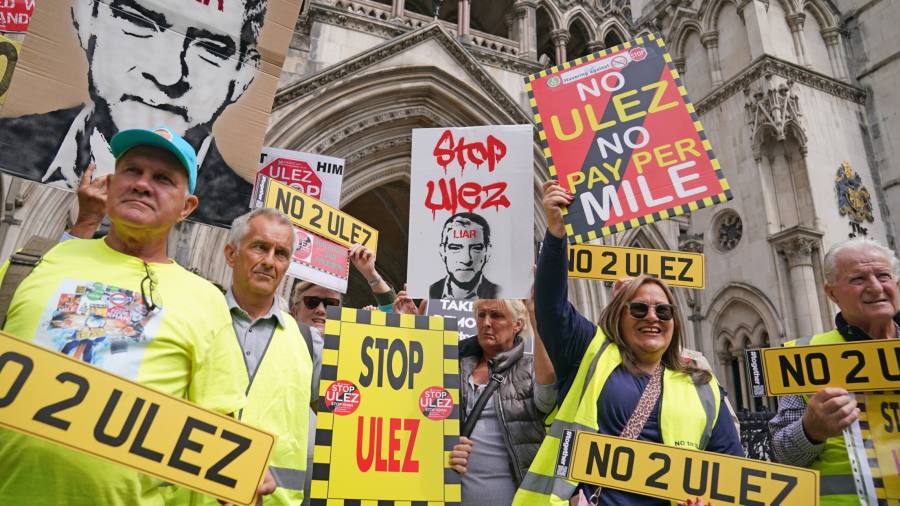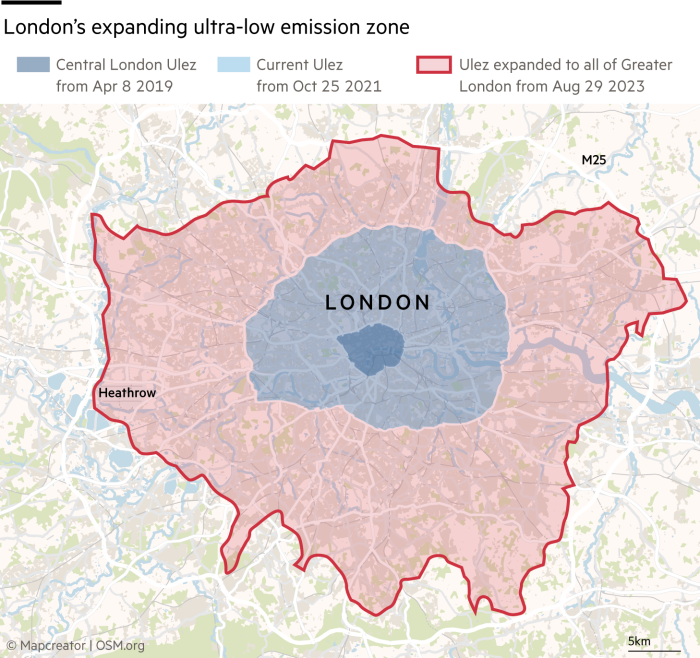
Receive free London updates
We’ll send you a myFT Daily Digest email rounding up the latest London news every morning.
Mayor Sadiq Khan’s controversial plan to expand London’s clean air zone should be blocked, in part because of a flawed and “unintelligible” consultation process, the UK’s High Court heard on Tuesday.
The Conservative-led councils of Hillingdon, Harrow, Bexley and Bromley in outer London, as well as Surrey County Council, have launched legal action to challenge the Labour mayor’s expansion of the ultra-low emissions zone across all 33 boroughs of the UK capital. The move is due to come into force on August 29.
First introduced in 2019, the zone imposes a £12.50 daily charge on drivers of older and more polluting vehicles in an effort to improve air quality and tackle congestion.
The Ulez originally applied to a small part of central London but it has already been expanded once to cover all areas within the north and south circular roads that ring inner London.
The push to extend the Ulez further has sparked a political backlash and been criticised by Conservative councils and some small businesses. They argue that Khan should reverse his plans because many people cannot afford to change vehicle or pay the daily levy.

Craig Howell Williams KC, representing the five councils, said the expansion was unlawful on three grounds, including “impenetrable” data used in the public consultation.
The court was told that a “critical” part of a consultation document from Transport for London, which forecast how many vehicles would be liable to be directly affected by the expansion, was “unintelligible” and “contradictory”.
“Consultees were not able to respond properly,” Howell Williams said.
TfL, which is responsible for the capital’s public transport and main roads, has estimated that 91 per cent of vehicles in outer London will be compliant by August.
In written arguments, lawyers for TfL, which is defending the case on behalf of the transport body and Khan, said the public consultation had provided “more than sufficient information” for people to make an informed judgment.
Howell Wiliams also said the expansion of the Ulez should have been effected through new legislation, rather than by extending an earlier order that created an original low emissions zone in 2007.
The councils also alleged that a £110mn scrappage scheme to encourage people to switch to less polluting vehicles should have been widened to include a “buffer zone” of people living close to, but outside of, London.
TfL’s lawyers said Khan had “express power” to extend the order that set up the 2007 zone and that an extension of the scrappage scheme had been “considered” but rejected because of “finite public funds”.
A spokesperson for Khan said in a statement on Tuesday that the decision to expand the Ulez “was not an easy one” but that Khan was “not prepared to stand by and do nothing”, pointing to data showing 4,000 Londoners a year die prematurely from air pollution.
Areeba Hamid, joint executive director at the charity Greenpeace UK, said in a statement that Ulez was “one proven method to help urgently reduce the number of cars on the road”.
“Instead of setting their lawyers on the mayor, these councils should work with him to create a transport system that helps people get around with[out] poisoning our air,” she added.
The two-day hearing continues on Wednesday.